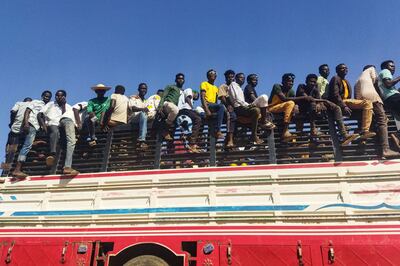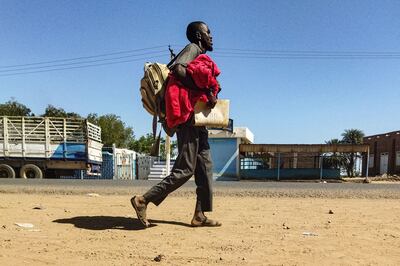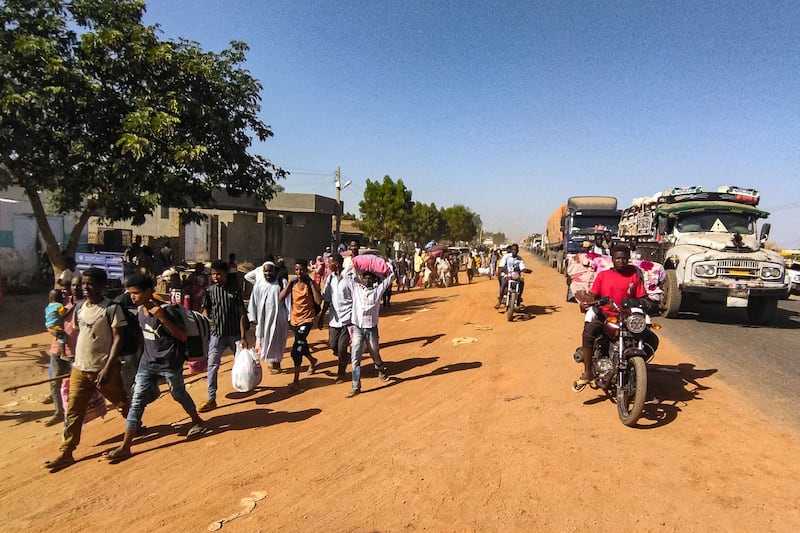An attack by Sudan's paramilitary Rapid Support Forces on the city of Wad Medani is an ominous development in its war with the Armed Forces and threatens to drag the country's southern and eastern regions in the eight-month-old conflict, analysts said.
The RSF has been fighting troops from the garrison in Wad Medani, capital of the Al Gezira state – Sudan's breadbasket, since Friday. The army sent warplanes to drive the paramilitary back.
The fighting forced thousands of people to flee their homes, joining the more than six million who have been displaced since the war broke out in April with clashes in Khartoum, according to UN figures.
The conflict has also created the world's largest humanitarian crisis, with more than half the country's estimated 50 million people in need of assistance. About 1.3 million have sought refuge abroad.
The RSF said its attack on Wad Medani, 180 kilometres south of Khartoum, was a pre-emptive move to thwart the army's use of the area as a launching pad for an offensive. The army said the attack underlined the paramilitary's resolve to kill civilians and loot their property.
The RSF claimed the army planned to use 40,000 volunteers to attack its forces.
The army has assured Wad Medani's residents that it is in control of the situation and urged them to stay at home and disregard what it called rumours and lies on social media.

Videos posted online by residents purport to show RSF fighters inside the city. Other clips show warplanes overhead as gunfire and explosions sound in the background.
There was also video of traffic disruption as hundreds of vehicles loaded with passengers and their belongings abandoned the city.
“Those who are running this country and everyone involved in this war are not worthy of respect,” said Wad Medani resident Hesham Abdel Malek.
“They never took the side of the ordinary folks or helped us move to safer areas.”
The UN said that 14,000 people had fled at the weekend.
Al Gezira state is home to about 500,000 people displaced by fighting, mostly from Khartoum. Of these, an estimated 90,000 live in Wad Medani.
The area was being used as a centre for relief efforts, but the fighting has forced the UN humanitarian agency to suspend its work in Al Gezira “until further notice”.
More than 270,000 of Wad Medani's 700,000 residents are dependent on humanitarian aid, according to the UN.

The US State Department has called on the RSF to immediately cease its advance in Al Gezira and to refrain from attacking Wad Medani. It also urged the army to avoid clashes with the RSF and other actions that would endanger civilians.
An RSF advance risked mass civilian casualties and significant disruption of humanitarian assistance efforts, the US said.
“This latest development will only result in the displacement of more civilians and deny them and others assistance,” said Sudanese political analyst Abdul Rahman Al Hady.
“The Rapid Support Forces has no political vision to guide it. Its culture is based in large part on terrifying people, looting and violating sanctities.”
The RSF's forerunner is the Darfur-based Janjaweed militia, which is accused of committing war crimes during a civil war that raged in the western region in the 2000s, when it fought on the government's side against ethnic African rebels.
The International Criminal Court said it is investigating the ethnically-motivated killing last summer by the RSF and its local allies of hundreds, possibly thousands, of ethnic Africans in western Darfur.
The violence also forced tens of thousands to flee across the border into Chad.
The RSF denies the charges, saying the violence was the result of tribal clashes in which it had no part.

The RSF is also accused of large-scale looting in Khartoum, which it virtually controls. It is also accused of arbitrary arrests, torture and sexual assaults in the capital.
Analysts said the capture of Wad Medani could herald further RSF incursions into eastern and southern Sudan, with the cities of Sennar, Kassala, Damazeen, Kosti and Qadaref among those at risk.
“This is possibly the gravest moment in Sudan's modern history. The country could break up,” said analyst Ashraf Abdul Baqi. “The Rapid Support Forces may not be able to control the whole of Sudan, but its actions disrupt life in the country.”
The RSF controls a string of cities in Darfur and maintains significant military presence in the western Kordofan region.
The latest escalation signals the unwillingness by both warring sides to stop fighting and is likely to delay or cancel altogether a much-heralded meeting between army chief Gen Abdel Fattah Al Burhan and a representative of the RSF to discuss a permanent ceasefire.
The RSF already said its commander, Mohamed Dagalo – Gen Al Burhan's one-time ally – would not attend the proposed meeting.
Neither the army nor the RSF have been able to gain the upper hand in the conflict, with the army's shortage of trained men prompting the enlistment of able-bodied civilians.
It has relied heavily on artillery shelling and air strikes to dislodge RSF fighters deep in the capital's residential districts, with little success.
The RSF ranks, on the other hand, have been decimated by the army's air strikes, forcing the militia to recruit fighters from neighbouring Chad, South Sudan and the Central African Republic, according to analysts.






